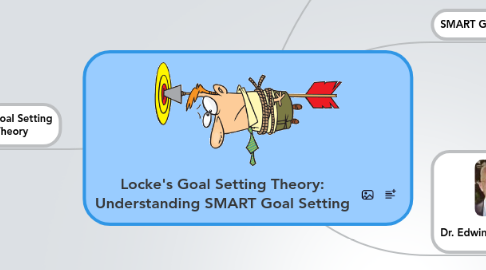
1. Goal setting
1.1. Motivate yourself
1.2. Motivate others
1.3. Necessary for success
2. SMART Goals
2.1. Specific
2.2. Measurable
2.3. Attainable
2.4. Relevant
2.5. Time-bound
2.6. Links
2.6.1. Wikipedia
2.6.2. MindTools
3. Dr. Edwin Locke
3.1. Original research in 1960s
3.2. Employee motivation
3.2.1. Need clear goals
3.2.2. Need appropriate feedback
3.2.3. Leads to reached goals and performance (success)
3.3. Confirmed usefulness of SMART goal setting theory
3.4. Continues to influence goal setting & performance today
3.5. Links
3.5.1. Wikipedia
3.5.2. Locke's Website
3.5.3. Locke & Latham ('90): "Theory of Goal Setting and Task Performance"
4. Goal Setting Theory
4.1. Clarity
4.1.1. Measurable & unambiguous
4.1.2. Clear & specific
4.1.3. Know what's expected
4.1.4. SMART
4.1.4.1. Specific
4.1.4.2. Measurable
4.1.4.3. Time-bound
4.1.5. Examples
4.1.5.1. Get 90% or higher on exam
4.1.5.2. Try hard; do your best
4.2. Challenge
4.2.1. Hard goals are more motivating than easy goals
4.2.2. Significance of anticipated accomplishment
4.2.3. Compensation; reward
4.2.4. Appropriate balance between challenging goal & realistic goal
4.2.5. SMART
4.2.5.1. Relevant
4.2.5.2. Attainable
4.3. Commitment
4.3.1. Understood & agreed upon
4.3.2. Involve employees in setting goals & making decisions
4.3.3. Not every goal has to be approved by employees
4.3.3.1. Goal consistent with overall purpose
4.3.3.2. In line with previous expectations
4.3.3.3. Person assigning goal is credible
4.3.4. Modified SMART
4.3.4.1. Realistic
4.3.4.2. Agreed
4.4. Feedback
4.4.1. Clarify expectations
4.4.2. Adjust goal difficulty
4.4.3. Gain recognition
4.4.4. Provide benchmarks
4.4.4.1. Regular progress reports
4.4.4.2. Especially important with long-term goals
4.4.5. SMART
4.4.5.1. Measurable
4.5. Task Complexity
4.5.1. Ensure that work doesn't become overwhelming
4.5.1.1. Enough time to learn what is expected
4.5.1.2. Sufficient time to meet goal
4.5.2. SMART
4.5.2.1. Attainable
